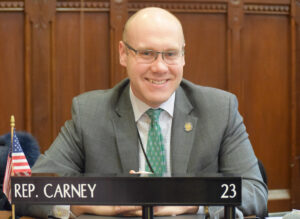On Friday, March 1, at 1 p.m. in Room 2E of the Legislative Office Building, the Education Committee will be holding a public hearing on legislative proposals to force smaller school districts to regionalize into much larger ones. This legislation affects Lyme-Old Lyme Schools because even though Lyme and Old Lyme are already regionalized into Regional District 18, the total number of students in the district is significantly less than 2,000, which is proposed as the minimum size (number of students) of any school district.
For more information on and background to this topic, see our previous article published Feb. 26, titled, Two Bills in Hartford Propose Regionalizing, Consolidating School Districts.
The legislative proposals being heard are:
Senate Bill 457 AN ACT CONCERNING THE SIZE OF SCHOOL DISTRICTS
Requires any school district with a student population of fewer than 2,000 students to join a new or an existing regional school district until that district equals 2,000 or more.
Senate Bill 738 AN ACT CONCERNING THE CREATION OF REGIONAL SCHOOL DISTRICTS
Requires towns to join state-created regional school districts similar in size to the state’s Probate Districts.
Governor’s Bill SB 874 AN ACT CONCERNING EDUCATION INITIATIVES AND SERVICES IN CONNECTICUT
Creates a state Commission on Shared School Services for the purpose of developing a statewide plan for the redistricting or consolidation of school services and school districts.
The concept of state-forced regionalization is supported by the Senate President, Martin Looney, and the Senate Majority Leader, Bob Duff. Governor Lamont supports forming a commission that would create a statewide plan for forced regionalization and penalize school districts that don’t participate. These bills would impact Lyme and Old Lyme despite the fact that they are already regionalized, since these bills call for districts larger than Regional District 18.

State Rep. Devin Carney (R-23rd), whose District includes both Lyme and Old Lyme, offered the information given above in an e-mail sent today to many of his constituents. In the same communication, he states his opinion of the proposal as being, “I am opposed to these bills because, if passed, they would negatively affect the quality of education in Lyme, Old Lyme, Old Saybrook, and Westbrook. Forced regionalization could also harm our property values and quality of life. I believe decisions involving regionalization of education and school services should be made locally and not by bureaucrats and politicians in Hartford.”
He adds, “Whether you support these ideas or not, I would encourage you to make your voice heard. You can have your voice heard by submitting written testimony to the committee or you can testify in person.
You can submit written testimony by sending an email to [email protected]. Please make sure to reference the bill numbers you are submitting testimony for/against and copy me on the email at: [email protected].
Electronic testimony needs to be submitted no later than 3:30 p.m. on Thursday, Feb. 28.”
Details regarding how to testifying in person are as follows:
Sign ups for the public hearing will be from 10 a.m. to 12 p.m. in the lobby of the Legislative Office Building. The order is first-come, first-serve. The first hour of testimony is reserved for public officials, and after that, students will be given preference so that they can finish early. Everyone who signs up gets to speak, and the hearing will remain open until there are no more speakers.
You will have three minutes to speak before the Education Committee. If a Committee member asks you a question afterwards, you may take the time you need to answer.
If you are speaking at the hearing, you should also submit written testimony so that it will appear in the public record, in the file of each bill. Legislators often refer to written testimony when they are voting on the House or Senate floor – especially when they have not come across a bill earlier in the session.
Submitting your written testimony:
- Email it to the Committee by 3:30 p.m. on Thursday, Feb. 28
- Put your testimony in either a Word document or a pdf
- Include the bill number(s), your name, and your town
- Attach the document to an email
- Put the bill number(s) in the Subject Line of the email
- Send it to [email protected]
You may submit written testimony regardless of whether you are speaking at the hearing.
Carney notes in his email, “”This is anticipated to be a long hearing, so plan accordingly if you plan on attending.
He also says, “If you have any questions about this or if you would like to speak with me about a concern regarding state government, please email me at [email protected].